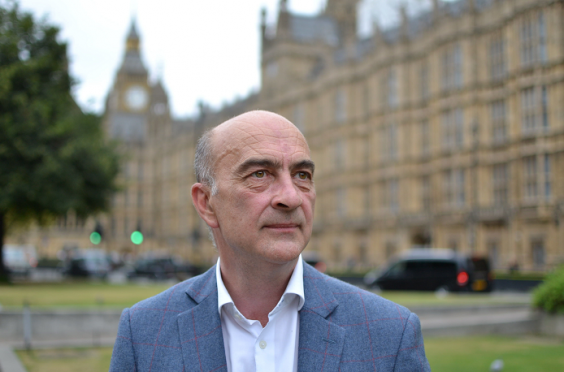Last Saturday I heard a tale which showed that, even in the darkest of days, there are some people whose human kindness can shine through the deepest gloom.
It is a story about the triumph of good over evil and about an indomitable spirit. An account of unlikely alliances, of human kindness, and a will to survive.
It is all the more remarkable because it has only recently come to light. It happened over 70 years ago when Jersey was under the oppressive occupation of the Nazis.
The 40,000 islanders faced curfews, severe food shortages, the daily dilemma of cooperation or confrontation and the brutality of martial law. No matter how they reacted to the German invasion, they all suffered.
This is the tale of one of them, Dorothea Le Brocq.
Dorothea married an Austrian who had come to Jersey before the war. After the occupation of the Channel Islands, he was conscripted into the German army and posted to the Eastern Front.
But, for Dorothea, her association with somebody who fought for Germany – however reluctantly – meant she was shunned by her family.
She was labelled a “Jerry-Bag” – the derogatory name for local women who fraternised with the enemy.
But Dorothea had a secret.
She had met a lady called Hedwig Bercu who had faked her own suicide in an effort to escape capture and being sent to a concentration camp. She had also changed her name from Goldberg. Hedwig was Jewish.
After leaving a pile of neatly-folded clothes on the beach one night, Hedwig turned up at her friend’s house. Dorothea gave her sanctuary and hid her in her home for 18 months, knowing that discovery would have meant internment or an even worse fate.
In a surreal twist, Hedwig had met and would later marry a German officer stationed on the island. He was aware of the deception and helped to smuggle food to the two women.
But rations were meagre and the duo resorted to scavenging for dead fish on the beach at night to keep the extremes of hunger at bay. Somehow, they survived.
Jersey was eventually liberated in May 1945. Hedwig and her German husband had a long and happy life together.
Not so for our heroine, Dorothea. Her husband was assumed to have been killed in action. She married again and moved to England. But in 1947, her “dead” husband turned up to look for her on Jersey. He had been held by the Russians as a prisoner of war.
She was, unwittingly, a bigamist and the courts were understanding, but her husbands less so. Dorothea was abandoned by both and lived out her life alone.
She went to her grave with her remarkable story untold.
Until now.
Her closest living relative is only a second cousin, but was completely unaware of her existence until her tale came to light. The secrecy – or shame – of her marriage to somebody who had fought for the Germans had airbrushed her heroism from the family history.
That has now been put right.
At a ceremony in St. Helier last week, Dorothea was awarded the prestigious “Righteous Among Nations” award by the Israeli ambassador.
Hedwig Bercu’s children were there as well to give thanks to their mother’s saviour.
Dorothea Le Brocq was a beacon of light in Jersey’s dark days of Nazi occupation.
Least physically active in the world…
It was painful to read last week that Scottish kids are the least physically active in the world according to a study by a network of researchers and health professionals.
We came bottom of the international league table.
How things have changed.
My youth was marked out by my mum trying to get me back into the house, not encouraging me to go out.
Parks were for playing football in. Back gardens for playing soldiers or hide and seek.
The seaside wasn’t for sunbathing, but for beach cricket and digging canals.
Okay. We didn’t have the trappings of modern technology. Just fresh air and endless energy. And yes, things changed when I discovered girls!
But the advent of smartphones doesn’t explain Scotland’s dire record in this survey.
There must be something else going on. Answers on a postcard please.
But whatever it is, it’s time we got physical again. So our kids can literally be fit for life.
St Andrews Day
Wednesday is St Andrew’s Day. A chance to celebrate Scotland and great Scots.
It was at a St Andrews’s day reception in 10 Downing Street last year I met a man who was one of our finest, Eric “Winkle” Brown.
He was Britain’s greatest pilot, and died earlier this year at the age of 97.
On that evening, he and his wife were special guests of the Prime Minister, David Cameron. The Boss was captivated as Winkle spoke, modestly, about his exploits. One of my treasures is a photo of the meeting.
Winkle’s career was extraordinary.
He flew 487 different types of aircraft, a world record that is unlikely ever to be matched and piloted 2,407 aircraft carrier landings.
He was the pilot’s pilot, who survived 11 plane crashes and the sinking of HMS Audacity in 1941.
He met Winston Churchill and King George VI numerous times and was at the liberation of Bergen Belsen.
After the war, he interrogated several of the leading Nazi figures, including Heinrich Himmler, Hermann Goering and Belsen’s chief guards, Josef Kramer and Irma Grese.
Such was his fame that Neil Armstrong sought him out and the pair became good friends.
And there was more, so much more, packed into an extraordinary life of service. This is but the very edited highlights.
Winkle, this St Andrew’s Day, we salute you.
PS. The BBC made a short film of his life. It is not currently available on iPlayer.
But it should be.
